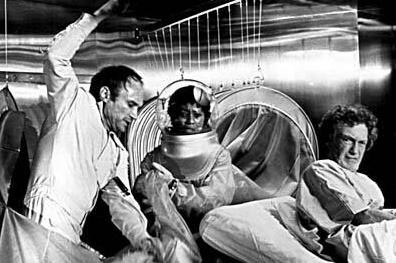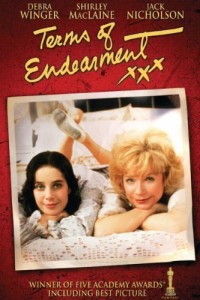Michael Crichton's 'Sphere': The Power of Positive Thinking
What a difference 27 years makes, huh? I’m referring to the gap between the 1971 film adaptation of Michael Crichton’s The Andromeda Strain and the 1998… whatever that was… of Sphere. I mean, we’re mostly going to be talking about Michael Crichton’s novels, but to prattle on happily for several paragraphs about Sphere without acknowledging what Barry Levinson did to it would be like not picturing a blue Billy Crudup in your head while re-reading Watchmen. We need to breathe through it, come to acceptance, and move on.
That was a shitty movie. And, to my earlier point about the gap between The Andromeda Strain and Sphere, here is what a team of scientists and hangers-on looked like on-camera in 1971:

And here is what they looked like in 1998:

Which, whatever, there are plenty of sexy scientists in the world (I mean, have you seen Lisa Randall? Rowr!) and Dustin Hoffman is not necessarily having panties thrown at him in recent years, but it legitimately was a time in which sci-fi movies tried to be about sci-fi. And you can say “it’s what the people want,” but Sphere made back less than half its budget and The Andromeda Strain made… I mean, it was 1971, so enough to pay for Sharon Stone’s wet suits on Sphere, probably, but no one was sitting on a $45 million dollar loss. The big ticket item? They spent $300K to build the scientific lab set. PRIORITIES, you know? And it made sense. Literally no human being who watched Sphere without reading the book understood what the hell was going on. Not one. You can tell me you did, but unless it happened in a controlled environment where you were raised in captivity away from Michael Crichton novels and then watched Sphere and answered a series of plot questions of my choosing, I’m going to think you’re snowing me. And that scenario would make for a fascinating Michael Crichton novel, would it not?
Speaking of! Let’s talk about Michael Crichton. Biography of Michael Crichton: he is now dead, he was super tall (6’9), he wrote well over 12,000 books, he was very smart, he got a little weird in later years, and we should all be worshipping his golden statue for having given us so much pleasure. Do you even know what you owe to Michael Crichton? How many flights he made bearable? How many rainy weekends at your aunt and uncle’s cottage where you weren’t allowed to flush pee? You may not really understand, let me go on: he gave you George Clooney. Did you know that? Did you know that he created “ER,” which gave you George Clooney? Westworld? JURASSIC PARK? CONGO?
(I may be the only one who really liked Congo, but I really really really hate and fear non-human primates other than Koko, and it was nice to have that reinforced a little bit. I know, I know, the humans made them that way to guard the whatever they were guarding. Still.)
Sphere is pretty great. I think, like most Crichton novels, you can see that tension between the Michael Crichton who, like Roman on “Party Down,” dreamed of writing hard sci-fi (no dragons!), but also knew that his bread-and-butter was cinematically-appropriate tales of the natural human reactions to an initial sci-fi concept. Which is what Robert J. Sawyer, the superb Canadian sci-fi writer, does as well. You’ve got the alien sphere, or the spreading contagion, or the rogue androids in Western wear, and what makes it a Crichton novel is making you care about the little band of people who has to deal with it.
To return to the fundamental question of Classic Trash, that we only reference when it seems convenient to the discussion: “is it any good?”
Well, yes. Crichton is not Alice Munro (though we can all fantasize about the end result of their collaboration, in which a young woman grows to adulthood in a small Western Canadian town and then encounters an alien sphere that gives her unconscious mind the power to create any manifestations she chooses) but he has that great talent the snobs lament: making you care what comes next. And then and then and then and then. You can be the purest of the pure sci-fi. You can understand cybernetics. You can create fake but super-plausible looking computer code and warning symbols that look scary and come up with something that makes it seem not-insane that we might reanimate cloned dinosaurs out of New Age jewelry-looking stones, but unless you have the intangible and rare ability to make someone miss their subway stop to figure out how the scientists can manage not to bring the threat back from the ocean in their own minds, you are never going to be able to afford to build a life-size replica of the Parthenon in your back forty. That’s just how it is. You think you’re better than JK Rowling? Maybe you are! It doesn’t mean shit. Give the people what they want, y’know?
We haven’t said much about Sphere, really, because who knows if you’ve read it? This is more about Michael Crichton. But it’s also a little bit about the failings of Michael Crichton, such as they are, because he’s never quite willing to go scorched-earth. Which is what happens at the end of Sphere. Our heroes need to kill themselves. Anyone could tell you that. And, instead, they use their newfound supernatural powers to choose to forget that they have those powers, rendering everyone safe and happy and innocent and bounding off, like the end of The Langoliers, to live the rest of their lives. And that’s why it’s a really fun book, and not, maybe, a more artistic book that ends with three dead bodies in a decompression chamber, or an explosion taking out the three survivors and the sphere itself, or a Russian woman woman being run over by a train.
The Plot Questions You Would Be Asked After Seeing Sphere (1998)
Who was Jerry?
What happened to Liev Schreiber?
Were there any aliens?
What year did the ship arrive under the ocean?
What was the sphere?
What does the sphere do?
When they’re in their decompression bunker, how exactly do they solve their problem?
What is the mechanism by which that even works?
Why did the sphere shoot into space at the end of the movie?
DISCUSSION QUESTIONS
No, really, though, aren’t you terrified of non-human primates?
Aren’t they hideous-looking and scary?
You know that a grown chimpanzee, for example, will eat your eyes and nose and genitals and rip off your arm and then penetrate you with it as soon as look at you?
You don’t on some level think they look exactly like your id?
That non-human primates are a physical representation of your most instrinsic and unpleasant primal nature?
I mean, it’s not like you don’t think they should have some kind of rights.
Like, in Spain, the great apes have legal protection.
That seems about right.
You know who seems like a real asshole?
That Mike Rice guy that Rutgers just fired.
Is there a great work of sci-fi that ends with the annihilation of our heroes?
Should you write one?
What is the absolute best sci-fi?
Discussion Answer: The Left Hand of Darkness, Ursula K. LeGuin.
Previously: ‘Mommie Dearest’: Once More With Wire Hangers
Nicole Cliffe is the books editor of The Hairpin and the proprietress of Lazy Self-Indulgent Book Reviews.
New York City, April 2, 2013

★★★★ Helicopters and small planes buzzed above the brown river. An aluminum sawhorse barricade skittered a few inches in the wind. It was cold, measurably and palpably cold, yet somehow not cold-cold; the underlying chill was gone. A youth in full baseball uniform, royal blue socks pulled up high, thumped a ball over and over into his glove as he waited on the subway platform. The wind hissed through bamboo on the pedestrian stretch of Rivington Street. The Chrysler Building stood, the color of dead oak leaves, in its own individual patch of cloud-shade. The sunlight was as deep and full as the cold was shallow. Light flickered through the branches in the afternoon, played on a man’s orange stocking cap and furry coat collar, spilled out of the overflowing sky in beams and reflections and an undefined luminosity even in the streets that fell in shadow.
"Was This Meat Shot Locally?"
“The experience of dying at a slaughterhouse is ‘an enormous ordeal’ for cattle. A farm in northern Germany is proposing an alternative: shooting the livestock in the places they live. Many believe the method provides a stress-free death for the animals.”
45 Years Ago, The iPad Was First Used By Astronauts Before Another Computer Tried To Kill Them All
The first mobile call was made 40 years ago today, on a device based on the communicators used in the original “Star Trek,” and the iPad was apparently introduced in 2001: A Space Odyssey, released 45 years ago this week. It’s a good thing that show business invented the future for us so long ago, because god knows we can’t come up with anything on our own.
The Perverse Secret Agenda of the Restaurant Critic
by Zach Maher

Last February, an iteration of the Olive Garden restaurant chain opened in Grand Forks, North Dakota. “The place is impressive,” Marilyn Hagerty wrote in her curiously favorable review for the Grand Forks Herald. “The chicken Alfredo ($10.95) was warm and comforting on a cold day. The portion was generous.” Hagerty’s review consisted almost entirely of declarative statements of fact about the restaurant’s décor, the size of its menu’s portions, and practical background info intended for prospective diners. Reactions to Hagerty’s subdued encomium ran the gamut of cosmopolitan condescension: from delight in her earnest sincerity to heartfelt pity.
Then in November, Pete Wells, restaurant critic for the New York Times, reviewed Guy’s American Kitchen & Bar, a 500-seat vasty hangar of a Times Square mess hall and the 11th restaurant opened by Food Network personality Guy Fieri. Guy’s American Kitchen & Bar was spun off from Fieri’s TV show “Diners, Drive-ins, and Dives.” The program features Fieri visiting unpretentious joints beloved by locals all over the nation and sampling the idiosyncratic fare in situ. The Food Network markets Guy’s televised road trip as a kind of roving celebration of vernacular American foodways. Wells’ review of the restaurant thusly inspired consisted of forty-six questions directed at Fieri: “Have you eaten at your new restaurant in Times Square?” Wells asked. “Did it live up to your expectations?” “When you cruise around the country for your show, rasping out slangy odes to the unfancy places where American like to get down and greasy, do you really mean it?”
Two days after Wells’ review appeared in the Times, Guy Fieri flew red-eye from his home in Northern California to defend his restaurant on NBC’s Today Show in New York City. “I have a problem with the tone, the sarcasm, and the question style,” the restaurateur complained to Savannah Guthrie. But the tone of Wells’ review, apart from a couple flights of ironic hyperbole, could hardly be called sarcastic. Mostly, Wells interrogated Fieri about the divergence between what’s on his menu (“Guy’s Famous Big Bite Ceasar”) and what’s on his plates (“a small salad with four or five miniature croutons.”). The review wasn’t a drubbing so much as it was an exercise in meticulous accountantship. That acid taste rising in your throat isn’t a bilious impulse, Wells assured us, the food actually tastes that way. But Guy Fieri was suspicious of ulterior motives on Wells’ part. “I think we all know what’s going on here,” Guy told Savannah on the Today Show, sitting before a plate of the questionable cuisine: “He came in with another agenda.”
Over the course of a two-minute chat with Savannah, Guy accused Wells of having an agenda, or ‘another’ agenda, three times.
Fieri seemed to suspect that Pete Wells came to Guy’s American Kitchen & Bar in bad faith, just itching to really pan the place, and this hypothesis seems improbable. A month after Wells’ review ran, the Times’ website hosted a Q&A; for the reviewer and the online forum was overrun with Fieri-related queries. To those questioners accusing him of elitist pot-shotting, Wells responded: “I respect what Mr. Fieri does in his show ‘Diners, Drive-Ins and Dives.’”
800 Olive Gardens have opened globally in twenty years. Surely everyone in America is past the introductory stage. And Guy Fieri’s target demo isn’t exactly coextensive with the readership of the Times’ ‘Dining’ section; a high-minded consideration might be misdirected. But both Hagerty and Wells reviewed a restaurant, new in town, for a local paper and in both instances, the subject was a surprising choice. The two restaurants are so obvious or otherwise unassuming as to be apparently beneath scrutiny. But if his agenda wasn’t to pick a fight or spit class bile, then what was Pete Wells doing at Guy’s American Kitchen & Bar?
The first restaurant reviewer was Alexandre Balthazar Laurent Grimod de la Reynière, (1758–1837), a Frenchman, disbarred attorney and lapsed theatre critic. He outlined his own agenda in the preface to the first volume of the Almanach des Gourmands. “The reversal of fortunes occasioned by the Revolution having placed wealth in new hands,” wrote Grimod de la Reynière (referring to the French one, of 1789), “and the newly rich desiring, above all, to employ their gains in sensual satisfactions, it was thought that a service might be rendered to the lately fortunate in the form of this guide, honest and true in its direction of their dearest affections.”

Grimod de la Reynière was uniquely qualified to serve as cicerone to the nouveaux riches milling about First-Empire Paris with full pockets, empty stomachs and uncivilized ideas about how the twain might meet. Before the Revolution, Grimod de la Reynière pere held the hereditary office of fermier général, collecting tax revenues per a contract with the king; such a windfall made the family one of the wealthiest in Ancien Regime France. Grimod learned how to use a fork, sort of, at his dad’s table, renowned for its bounty. Grimod’s congenitally malformed hands were cause for chagrin in the family: “one ended in a sort of talon,” a biographer notes. The right one was webbed, like a duck’s foot. His parents blamed a careless servant and a hungry pig. Commentators have quibbled about how he manipulated utensils. Nonetheless, the kid was excluded on the grandest occasions and whenever company was over to eat, an injustice that denied him his right and illustrious — an 18th-century diarist had dubbed Grimod pépé the foremost gourmand of that century — inheritance.
So it wasn’t until a period of peripatetic trial, imposed when an elaborate prank involving a funereal banquet and a pig dressed in the likeness of his father prompted disbarment and parental ejection from Paris, that Grimod truly learned how to feed. Banished, he was chased by the wolf into a monastery with ample provender. The welcoming party was an abbot near Nancy with a discerning palate and a hospitable inclination. The regional cuisine is heavy on cream and potato; Grimod was sufficiently inspired to briefly operate a gourmet delicatessen in Lyon. Few ecclesiastical indulgences have had happier consequences.

Bouleversement came in the form of the Revolution while Grimod fils was abroad cutting his teeth. The family was among those suddenly bereft of a livelihood. Tax collection was nationalized and Grimod’s father died of heartbreak. Grimod returned to Paris and tried his hand at theatrical reviews to support his mother; these were hungry times. Grimod was forced to let out the Hôtel Grimod de La Reynière, the grand family demesne just off Concorde, but stayed on in perpetuity as a rent-controlled tenant. Much later, the distressed property was eventually snapped up by the American embassy in Paris (who promptly outgrew the compound, razed it, and, with $10 million from Congress — $152 million, adjusted for inflation — threw up ‘un pastiche de style néo-classique’ on the valuable real estate).
The theatrical review that was Grimod’s outlet and only livelihood soon folded after his return to Paris, and the times went from hungry to starving. A gourmand thick or thin, Grimod wandered Les Halles for hours, calculating the tastiest expenditure of his last ecus. The butchers and greengrocers of the market, who once profited from the largesse of the father’s table, pitied the son’s humbled lot and supplied Grimod with delicacies at a cut rate. Thus it was probably here, at the massive central market where all of Paris bought its fruits, fish, meats and vegetables, that Grimod became intimately acquainted with cuisine’s new aristocracy: the restaurateurs.
“The revolution,” Grimod wrote in the Almanach, explaining the origin of the restaurant, “by forcing all those rentiers to go on a diet, forced the cooks out onto the street.” The political sympathies of chefs — formerly employed as servants of aristocratic appetite, after all — were suspect after regime change. (A self-identified ‘scullery boy’ and veteran of the kitchens of Marie Antoinette was convicted of “longing for the Old Regime” and given the patriotic haircut.) Many made the one career change totally beyond reproach: they became venture capitalists.
The restaurant was only a recent development. Rebecca Spang, in her indispensable The Invention of the Restaurant, describes the particular concatenation of effects that, in the decades before the Revolution, resulted in the novel institution: a fashion for healthful consumption among the smart Paris set; the Rousseauian assertion of individual liberty (to choose from a menu) and correspondent responsibility (to pay the bill); and, with clueless out-of-towners arriving in droves to roil the capital in the heady days before the Bastille, the commercialization of fraternal feeling into the hospitality industry. Neither private nor public, not old but not exactly new, the restaurant occasioned a pleasant bewilderment among Parisians in the twenty or so years around the Revolution, a frisson of confusion appropriate to the epoch. It was in this bittersweet spot that chefs hung a shingle and opened shop.
As Grimod must have realized while he drifted among the market stands at Les Halles, his stomach in a dull ache, and watched the marchands sell their tastiest cuts to upstart cooks, concessions would have to be made to the new and more liberal climate. In 1802, Grimod used the distinction of his good name to secure lines of credit and began entertaining lavishly. Distinguished gullets and friends who knew their way around a dinde aux truffes were invited to dine at the leveraged family manse. The restaurateurs, eager to advertise their creations to such a desirable demographic, were more than happy to serve their best. And a year later, the first volume of the Almanach des Gourmands appeared on the bookstalls. It promptly sold out of four editions.
Food writing was nothing new. Cookery guides and household vade mecums had been instructing eaters for centuries, usually with a salutary bent. Through the Middle Ages, ecclesiastical scholastics (particularly French clergy, for some reason) took pains to record what they ate and drank and how it was prepared (Belgian trappists still brew the best beer in the world with centuries-old recipes). And in contemporary Paris, Jean Anthelme Brillat-Savarin, another barrister, was excusing himself from esteemed tables and scribbling notes that would eventually become The Physiology of Taste, that efflorescence of gastronomic thought (“Compared to him, I’m but a kitchen slave,” Grimod said of his cross-town rival).

But the collations that Grimod la Reynière published annually in omnibus format for eight years didn’t have literary pretensions, like the work of Brillat-Savarin. And while Grimod’s work had practical value, it aspired to a particular kind of permanence in post-Revolutionary France that no cookbook attempted.
Grimod began his Almanach with a Calendrier nutritif, a schematization of the months of the year according to those foodstuffs most appropriate for consumption. “…January brings a cloud of fowl, each more delicate than the last; and to begin with the fattest of all, the wild duck, whose arrival acts as a delicate thermometer, by which we might read the temperature of the winter to come….” A recipe for Canards sauvage, entrusted to Grimod by a monk whose esteemed kitchen was a casualty of the Revolution, is shared with the reader. The passage of a year discloses an unprecedented bounty, drawn from every corner of the Republic to be enjoyed in the capital at just the right time.
Once a new gastronomic calendar was established, Grimod moved to redesign all of France according to his tastes. “Paris, where the high life is most exquisitely pursued,” forms the axis of the gastronomic world. “Every avenue into the city is choked with wagons carrying every variety of foodstuff, innumerable herds of every specie, all of it destined for ingestion by the bottomless Parisian consumer.” For the benefit of this gargantuan neophyte, seated at the Parisian dinner table and hungry for wisdom, Grimod unfolds his extensive Itinéraire nutritif, ou promenade d’un gourmand dans divers quartiers de Paris. Decades before Baudelaire’s legendary flânerie (what Balzac, with a characteristic perspicacity, recognized as merely a ‘gastronomy of the eye’), Grimod takes his appetite for a walk through Paris, past the most delicious pâtisserie, the most reliable grocers, the wisest butchers and the choicest restaurants. “Entering the Tuileries and walking along the terrace of Feuillans, we admire the restaurant of M. Véry, where the mahogany, the mirrors, the marble and the bronzes hint to the uninitiated at what awaits him, and secure the restaurant’s reputation as the most luxurious of its type in Paris.” Hints and rumours, gleaming wood and glinting mirrors: this seems like insubstantial stuff to offer hungry parvenus. But while the guide might point out the sights and explain their provenance, he lets his charges find their own way to the table.
“Indeed,” writes Spang in The Invention of the Restaurant, “Grimod seemingly mapped a whole new world: a region with its own saints, calendar and geography.”
Us, the clientele, we’re always tourists in this new world. Not only are restaurants constantly opening, renovating, going bust or moving uptown, but we are inclined to graze and constantly change pastures. A table can only be rented after all, and just for a few hours (next time you’re dining somewhere classy, try to find a conspicuous timepiece in the salle à manger; you won’t). Like most tourists, we don’t speak the language; at least not fluently. Whether it’s written in gastronomical French or Guy Fieri’s homey babble, the menu we’ve been handed is nonsensical. The names of the dishes are mere words unattached to any experience we’ve had, a list of places that we’ve never been to. And that’s how we like it: novel, uncharted. The confusion is why we’re here and not somewhere familiar; why we didn’t just prepare dinner for ourselves at home.
If the menu isn’t a cipher and the setting doesn’t induce a delightful vertigo, then you’ve become a regular. Marilyn Hagerty didn’t so much review the Olive Garden as confirm to eager (“…the lines were long in February…”) Grand Forxites that an exact copy of the eatery they all knew and loved had finally arrived. After all, the Olive Garden’s is one of the first chicken Alfredo recipes that result from a Google search. You can make it at home and it tastes just like you get at the restaurant, honest.
But for those of us who stray, we don’t want to get lost. We don’t want to waste time or cash. We’ve profited from some recent change of fortunes, our billfold is full and we’ve worked up an appetite. The idea is, another revolution will be effected: we’ll leave satisfied, our wallet that much lighter.
Since Grimod de la Reynière, restaurant critics have mapped uncharted territories for the benefit of the hungry. (Carte, in French, might mean a bill of fare or a navigational instrument). Sometimes the reviewer simply takes us by the claw and conducts us to the threshold, invites us to feast our eyes and gently insists that yes, this place is every bit as real as it seems. But not all restaurateurs are so ingenuous as Grimod’s pals the Messrs. Véry. Quality is rarely self-evident. Charlatanism is notoriously sanguine about its endeavours, tending to a bluntness that could easily be mistaken for honesty. And when we seem to have been led astray, that’s when a map helps to explain the difference between what we’re told and what we taste.
“I’m doing the type of food America loves and I’m doing it the right way,” Guy Fieri insisted on the Today Show. Are you? asked Pete Wells. Wells’ questions demonstrated that Guy Fieri doesn’t mean what he says, and that a Broadway’s breadth separates the cuisine Fieri fronts on TV from what might be ordered at Guy’s American Kitchen & Bar. “Why,” Wells, almost heartbroken, asked, “is the cooking you celebrate on television treated with so little respect at your restaurant?” His somewhat jowly portrait, familiar to every mâitre d’ in the city, attests to Wells’ sincerity and the extent of his expertise. And in other reviews, maps that Wells has drawn of foreign places all across New York, he simply explains that there are other, better spots to put our mouths and our money.
If you’d like to sublet your apartment, rent a villa in the Midi, or find love, Zach Maher sells classified ads at the New York Review of Books
. Otherwise, he can be tweeted at.
Shock: More Late Night Drinking Leads To Fewer People At Work The Next Day
“It could be that it has improved health because people are drinking eight units over eight hours instead of four hours but hand on heart I’m not sure I believe that.”
— Some killjoy doctor presents the possible bright side to leaving bars open later before snatching it away.
On Memory And Honesty And The Line Between Fiction And Non-Fiction

“In the book, I tell a story about the day that my father brought home the news that he’d been diagnosed with terminal cancer. I was a senior in high school, a month shy of graduating; he was given two months to live. As you’d imagine, my family was fairly devastated, and my mother asked me to drive to the video store to rent a couple movies to get our minds off the news — comedies, my father suggested; he wanted to laugh. Operating in what I guess was a state of shock, I made a poor choice at the video store. I’d picked up my girlfriend on the way home, and on our way into the house, she asked what I’d rented and I told her and she stopped me cold — and I’ll never forget the feeling of standing in our carport, looking down at the VHS box in my hand, and seeing the cover of Terms of Endearment. It was a movie my dad and I had never seen, one we’d been wanting to see before he’d gotten sick. But we knew what it was about. Everybody knew what it was about — Debra Winger had been nominated for every award in the world for her performance of a woman who dies of cancer. I remember standing there at the door to my house, my feet on the green Astroturf that carpeted the step, and thinking to myself, How could you be so stupid? And opening the door and calling my mom over discretely, to show her the box, and telling her I had to go back to the store, that I had made a terrible mistake, and shaking my head as I closed the door again, backing away. It’s something that has stayed with me since. For twenty-five years now, I’ve been playing that moment over in my head. I’ve told the story to friends, talked about it with my family, and like I said, I wrote it into my book, in a chapter headed Dear Mom, Sorry for Choosing Terms of Endearment When You Asked Me To Go Out And Rent Some Movies for Our Family to Watch To Get Our Minds Off the Fact That Dad Had Been Diagnosed With Cancer. It’s very compelling, right? How emotional trauma can affect one’s thinking. The thing is, though, that didn’t happen. Not exactly.”
— In case you are not yet sick of me (related: I am starting to get sick of me), I wrote an essay for the Daily Beast about the writing of an essay that ran here at the Awl a couple weeks ago
.
Britain Reboots Class System
“British people can now aspire to and despise four new levels of social classes, according to a new survey conducted by researchers in partnership with public broadcaster the BBC.” Replacing your classic “upper,” “middle” and “working” cohorts are seven new classes: “Elite,” “Established Middle,” “Technical Middle,” “New Affluent Workers,” “Traditional Working,” “Emergent Service Workers” and “Precarious Proletariat.” Distinctions aside, they will all stab you for looking at them funny. Which one would you be?
Ask Polly: Why Is My Boyfriend Addicted To Internet Sex Chats And Why Won't He Stop Lying About It!

Appearing here Wednesdays, Turning The Screw provides existential crisis counseling for the faint of heart. “Because he’s just not that into anything, really, except himself.”
Hi Polly,
I met this funny, quiet, artistic, and all-around wonderful man shortly after I had escaped from an abusive relationship. We hit it off and started out a casual (albeit, exclusive) thing. I saw from the beginning that he was a bit of a flirt, in a self-deprecating, sarcastic kind of way that made women go “Oh youuuuu!” but hey, that’s what drew ME to him in the first place, so what the hell.
Fast forward 2.5 years. We’ve moved in together, gotten a cat, bought furniture from Ikea, talked drunkenly about marriage over cocktails at the local PF Chang’s. I’m in my mid-twenties and he just turned thirty, so more and more we think this is IT. It’s been fun! But it’s also been kind of anxiety-filled and shitty at the same time.
From the very beginning, things were weird. Being a bit of an anxiety-ridden shithead courtesy of my previous (super abusive emotionally/physically) relationship, I snooped on his stuff/phone and found out that he had VERY close relationships with his female coworkers. One even gave him a card that said he was the “light of her life.” Another he was still texting about her sex/relationship life, bantering to the point of inappropriateness. Couple this with the fact that he had sex with yet ANOTHER coworker, and another woman (not from his place of employment, thank god) whom he had slept with was dropping “tee he hees!” and innuendo all over his Facebook wall. (Barf.) I had to dig to find all of these interactions, he never told me up front that before we started dating, he had established these kinds of relationships with people with whom he worked 50 hours a week, or that they continued.
And yet even when things got more serious, we became an official couple, yadda yadda, I still found stuff like this on his phone or computer. I know, I was a shithead for snooping, but he was a shithead for continuing this kind of behavior even after I explicitly stated my boundaries and he said “Don’t worry, I will treat you with respect.” The climax came about a year into our relationship, when I found out that he was posting sexual ads on Craigslist. I read a few then felt so sick I threw up and sobbed with his roommate’s girlfriend until he came home. From what I read, he never met anyone, only chatted sexily with them and talked about meeting, but I’ll never know for sure. He said it was a form of porn, that he was absolutely satisfied with our relationship/sex life, that he was so sorry, etc. I, for one, was shook up. But I loved him, and he made me feel more like myself than anyone ever had, so I stayed.
⤏⤏ Think you know where this is going? Congratulations, you are correct! ⤏⤏
Even after that, he still hid little things from me, and password protected his phone and computer. I know, trust was destroyed on both ends and the snooping certainly didn’t help, but in the words of Dan Savage, “When a little snooping uncovers something big, well, it’s retroactively justified.” And Polly, I consider posting sexual ads on Craigslist as “big.” After the Craigslist fiasco we talked long and hard about the kind of relationship we wanted: one based on trust, understanding, compassion, etc. I told him that while some of his past acts were indeed boundary-crossers for me, I would have rather known about them up front. I was trying to get away from the worrywart in my head and really just open up and feel secure in my life and relationship. He seemed to agree that this would be best. We moved forward.
And yet… HE STILL HID SHIT FROM ME. By this point I had stopped snooping and was striving to trust him. I wanted to show him that I was turning over a new leaf, asking him to share his porn with me, exploring our individual fantasies, etc. I wanted him to feel comfortable sharing his life with me! For about six months, this worked. But then we decided to talk about our favorite porn sites, and he got weird and distant. A week later, I saw a sex cam website following him on Twitter. He swore he’d never do it again, etc, but I didn’t want that! I just wanted him to feel comfortable sharing his preferences with me. He said he would let me know if he felt he wanted to cam again, and the subject dropped.
In between that last big talk and now, he has hidden little things from me that I’ve stumbled on by accident, things like: taking up smoking again, going to a strip club with the guys, playing/talking with his ex fuck-buddy/coworker on Words with Friends… just stupid shit! And the topper: I was dicking around on the internet one day saw and Chatroulette come up in an article. Curious as to what the site actually was, I typed in the URL only to see that our IP address had been banned for violating the site’s code…. aka, nudity during video chats. My boyfriend had been camming for months without telling me, even though I’ve asked if he’s doing it again, and asked if he wanted to cam with me! (His answer: No, I don’t cam anymore for anyone or any reason.)
So now I feel like shit again. We talked, and he said that I am “not deserving of the anxiety he gives me” and that he “has always had communication problems in his relationships.” He also said that he doesn’t know WHY he hides things from me, only that he’s been trying not to ever since we decided to take a more healthy approach to our relationship, all to no avail. He also said that he can’t promise it won’t happen again, even after I told him word for word I DON’T CARE WHAT THE FUCK YOU DO, JUST COMMUNICATE YOUR NEEDS TO ME BEFOREHAND AND WE’LL WORK IT OUT, I LOVE YOU. He says all his needs are met, he is happy with me, he loves me. I’m shaken up again and I feel like this relationship is just one giant red flag waving in my face. Polly, I love this man. He is kind and supportive, he encourages me to go for my goals, and we still click on many levels. Should I work with him on this? Between all the crying and confessions, I said I would, but now I just feel empty and hurt. I can’t help but think that one day his secrets will escalate to an affair or some other horrible bullshit. He’s said things would never reach that level but…how can I be sure? I can’t be sure of anything he says anymore!
Yours anxiously,
The Worry Wart
Dear Worry Wart,
Dump this asshole immediately. I understand that he comes across as shy, sweet, charming, supportive, thoughtful on the outside, and that makes him particularly hard to kick to the curb. But this guy is a Big Bad Wolf in sheep’s clothing. He is a pathological liar and a cheat. I’m not saying he’ll be like that forever and ever. If he works very hard at it, he might modify his behavior. He might notice that it’s impossible to have any kind of a relationship with a healthy human being if you’re not honest.
That could take a decade, at least. Waiting around for him to grow is a big, big mistake for you. He is taking advantage of your commitment to him. You started out a snooper, a jealous type, and now all you’re saying is, “Loop me in! I can accept it!” But he doesn’t want you in there. Do you understand? He does not want an intimate relationship with you. He wants to play make-believe — with his “camming,” his porn surfing, his inappropriate talk with coworkers and with you. Every other sexy woman is supposed to pretend she’s about to sleep with him. You’re supposed to pretend that you two have a healthy relationship, when in fact you’re unhappy and insecure and lonely and he’s a lying sack of shit.
And now he has the audacity to say he can’t promise to change a thing? Listen to what he’s telling you: “You don’t deserve this anxiety.” You deserve better. That’s what he’s saying. And he’s right.
Don’t overestimate his power in your life. You feel like yourself with him because you’re getting older and stronger and he’s not physically abusive like your last shitty boyfriend. He IS a shitty boyfriend, nonetheless. Trust me, you will feel even more like yourself in your next relationship. The next time you fall in love, it will be a million times more satisfying and special than this time, because you will be very careful not to choose someone who’s sneaky and flirtatious (or a physically abusive jerk).
What I’d strongly suggest, though, is that you set out on your own and steel yourself for at least a year of thrillingly independent, celebratory singledom. I’m sure that someone with your history is afraid of such a thing, which is exactly why it’s going to feel so surprisingly great to be alone for a while. You will get a therapist, and see that person every week. You will discuss your pattern of chasing men who are self-serving, ego-driven narcissists incapable of real love, either openly or beneath the surface. You will discuss your anxiety issues, and consider meditation and cognitive therapy. You will find a sunny apartment that your cat will love. You will paint the walls bold colors, and get some new music and some new books and a whimsical light fixture that your ex would’ve hated. You will rededicate yourself to your female friendships. You will meet a few new friends and take some classes and learn some new skills. You are going to be much, much happier.
Don’t stay in the apartment you share now. Too many memories! Let him deal with the old place. Find a new place or check out a roommate referral service and get some new friends in the bargain. (Be very picky in roommates if you do this — only consider those with whom you’d want to spend a long afternoon drinking coffee.)

A PHOTOGRAPH OF JENNIFER LOVE HEWITT, WHO WAS BORN IN WACO, TEXAS
Yes, Worry Wart, I know you’re worried that you’ll be lonely. But nothing in the world feels more lonely than sleeping next to a lying asshole who’s constantly trolling for porn and making eyes at other women. Nothing. Look, I’ve dated guys who were open about their porn and their flirting. I had a boyfriend once who flirted with every living thing that crossed his path: man, woman, dog, cat, earthworm. He once walked into a Fatburger and had an absurdly provocative conversation with the 70-year-old woman behind the cash register. Don’t get me wrong, it was sometimes unpleasant. (“Can we fucking order our steak instead of chatting with this ugly teenage waitress, please?”) I wouldn’t personally recommend sleeping with a guy who beats off to photos of Jennifer Love Hewitt. But it was at least tolerable (and occasionally entertaining). What’s not tolerable is being bullshitted around the clock while your boyfriend secretly stirs up intrigue whenever you’re not around.
You’re going to look back on this guy and cringe. Believe it.
I also don’t think you should march into your next relationship announcing that you’re ok with porn and flirting and everything else under the sun. Because maybe that’s not you. Maybe, in an ideal world, you’d like a boyfriend who fantasizes about you most of the time, or who at least understands just what a slippery slope it is, chatting and emailing and Facebook-flirting with every woman in his stupid office. Maybe you’d like to be with a man who understands that it’s pretty stupid to say things like, “If I weren’t taken, you’d be first on my list.” (Um, you’d be last on my list, under the circumstances.) Even those flirts at the office probably wouldn’t date your guy, because they can see what a sleaze he is. Or, as two of the lazier little pigs put it, “Not by the hair of my chinny chinny chin. You can’t fool us with that sheep skin!”
I’m sorry that you’ve been through so much hellish worrying with this twerp. I know you love him. But you’re anxious precisely because you’re trying desperately to control something that is completely out of your control. Don’t waste another second of your time feeling sick over this dude. Put on your walking boots, pack your bags, and call your friends. Then walk straight out into the sunshine, and don’t look back.
Polly
Dear Polly,
I need to leave my boyfriend. I’ve known this, off and on, for a few months. I still love him, and I want to have a friendly, supportive relationship with him once it’s over. But he’s a heroin addict who keeps using (once a week mostly), and as much as I’ve never wanted to leave him for his addiction, I can’t deal with the pain and drama his using puts me through any more. I’ve gone from knowing he had a weakness to realizing he had no intention to get past it. It’s been hard enough to learn that I can’t actually fix somebody else. I’m really wondering whether I can fix myself.
I’ve been in this relationship for a year now. I’m 22, a pastry cook at one of the best restaurants in my city, and he’s 29, with his first job in three years building bikes, going to work three days a week, if that. He’s been living with me nearly a year and never paid rent or a single bill. I know that every thing I could say sounds like a bright red flag, but it’s hard to even say these things about someone whom I love and care about and want to help. I’ve lied awake many nights worrying about what would happen to my boyfriend if I kicked him out.
I know I have to break it off, but my problem is just how hard it is to cut that tie. For the past couple months I’ve felt too depressed or tired to do much of anything, and I’ve needed that other person to help me out or at least listen to me. I’m also a crazy hypochondriac and I really need someone else around to tell me I don’t have the bubonic plague sometimes. Plus I have my own problems with alcohol which have only been getting worse lately. It’s nice to have someone you know won’t judge you.
I used to be somebody I would respect if I met me. Strong, proud, independent, only a year ago! I would look down on the people my age who still had their parents arranging their leases. These days I can barely pay my rent, just walking to the store for cat food is hard enough. I want to live a happy, productive life, but it’s so much easier to keep things the way they are. I just don’t feel strong enough right now to live without some one I’ve been relying on. I know I’m depressed; I don’t know what to do about it. I’ve imagined breaking it off so many times and every time I picture myself completely falling apart.
How do you find the strength to be alone and successful after you’ve lost it? When I felt strong, I was a little lonely. Now, I just feel weak all the time, but at least somebody is there with me? Until he gets high and I’m alone again, or I’m with some guy who buys me drinks.
Feeling Used Can’t Keep
Dear FUCK,
Your boyfriend has no hope of kicking until you kick him out. He has never paid rent or a single bill. You might as well be scoring dope and shooting it into his arm for him.
Why is everyone so afraid of being alone in their 20s? What better time to be alone could there possibly be? I felt exactly the same way when I was younger, but now I don’t get it. I look back on my twenties and all I can think about is how much happier I would’ve been, if I had just been willing to pack my shit and walk out the door the second I started to feel disregarded or disrespected or compromised. The danger, for a woman who settles for too little, isn’t that she’ll be alone forever. The danger is that she won’t be alone for long enough. Instead, she’ll leap into the next thing before she figures out just how strong she really is.
You haven’t lost your strength. It’s still there. You aren’t just a little bit lonely right now. You are desperately lonely, weak, depressed and confused. And you’re only getting sicker and sicker as you let this situation go on longer, as you poison yourself and poison him with your avoidance and your neediness.
Call a shrink, call your mother, call your friends, and set up concrete plans to see everyone regularly over the next month. Assign everyone a day of the week. Put everyone on high alert, even if there are only two people you feel comfortable calling. The second you pick up the phone, I’m telling you, you’ll feel a little bit better. You need to come out of hiding and own where you are, and you need to let everyone know that you need them to lean on moving forward. Tell them, explicitly, that you need their help to get through this, even if it pains you to say it. Then tell your boyfriend he needs to find somewhere new to stay. Give him a weekend to clear out (while you’re somewhere else) (hide your valuables before you go).
Today is the day to act. Go buy “Hestia” by Katell Keineg on iTunes. It’s about a woman who’s leaving her heroin-addicted boyfriend, and it’s maybe the saddest yet most hopeful song ever written. Listen, I feel for you. I do. I’ve been right there, postponing the inevitable, wanting to wish it away and escape into something else instead. But you can’t put this off any longer. You are actively hurting yourself and making yourself weaker. It’s time to stop.
Polly
Previously: I’m In Love But My Best Friend Is Slipping Away!
Have you stopped making sense? Write to Polly and find out!
Heather Havrilesky (aka Polly Esther) is The Awl’s existential advice columnist. She’s also a regular contributor to The New York Times Magazine, and is the author of the memoir Disaster Preparedness (Riverhead 2011). She blogs here about scratchy pants, personality disorders, and aged cheeses.
Photo of what is surely a very nice guy used here to represent the neediness of terrible men by “bark.”
Men Better At Being Sad About Childlessness Than Women
“Men are almost as likely as women to want children, and they feel more isolated, depressed, angry and sad than women if they don’t have them, a new study says.”
